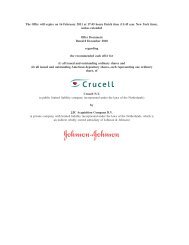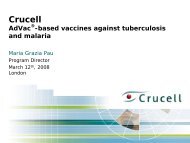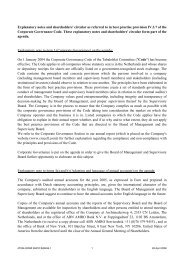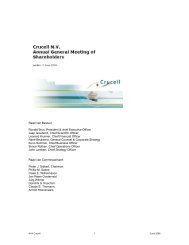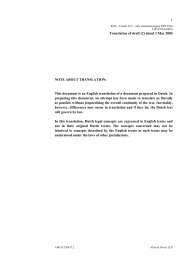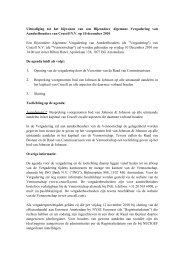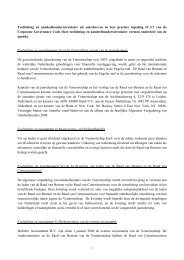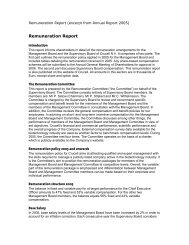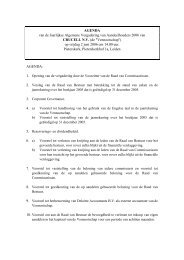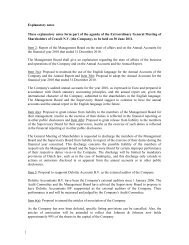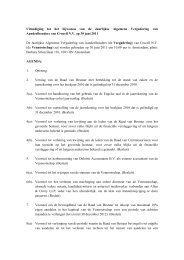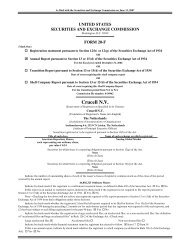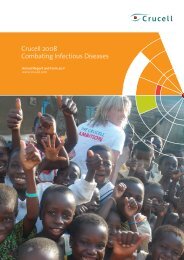Crucell corporate brochure (PDF)
Crucell corporate brochure (PDF)
Crucell corporate brochure (PDF)
Create successful ePaper yourself
Turn your PDF publications into a flip-book with our unique Google optimized e-Paper software.
<strong>Crucell</strong>’s commitment to the world – Taking responsibility<br />
Runa Khan, Executive Director Friendship<br />
“Let me tell you a true story… On char Bhatiborial under Sundarganj,<br />
Gaibandha, a young girl is already a mother at the age of 16. Khadija<br />
Begum was 15 when she married Shomizuddin. She had never<br />
received medical treatment or visited a doctor and had not received<br />
her tetanus injection (TT). She was not even aware that adolescent<br />
girls should receive three doses of TT under the Government<br />
Expanded Program on Immunization (EPI) to minimize the risk<br />
of infection during delivery.<br />
To her knowledge, the government has never held an EPI session at<br />
Bhatiborial and she does not recall a health worker ever visiting the<br />
char for health education. The closest family welfare center was<br />
approximately 3 hours away. To get there, she would have to walk<br />
2 kilometers over sand, wait for a boat that may come only twice<br />
a week (and not even at a fixed time), and then take a van ride,<br />
making her journey both tiring and costly.<br />
In May 2010, when she was about 4 months pregnant, a team<br />
showed up on her island—not only to conduct an EPI session on the<br />
char itself but also to inform and educate the community through<br />
household visits and group meetings.<br />
Khadija’s son, Mohammad Khairul, is now 5 months old and under<br />
the Friendship–<strong>Crucell</strong> EPI Support Program has received his BCG<br />
(tuberculosis), Quinvaxem® 1 and 2 (pertussis, diphtheria, hepatitis B,<br />
tetanus and Haemophilus influenzae type B), and OPV 1 and 2 (polio)<br />
vaccine doses. More importantly, Khadija is aware of when his next<br />
dose is due and will be bringing him to the center for it. If by chance<br />
she forgets, she is secure in the knowledge that a Friendship health<br />
worker will come by to remind her.<br />
Khadija Begum’s story is one of thousands. This outcome is made<br />
possible by the joint efforts of <strong>Crucell</strong> and Friendship.”<br />
NGO partnerships<br />
<strong>Crucell</strong> and Friendship<br />
<strong>Crucell</strong>’s partnership with Friendship is a good example of how we<br />
work with NGOs to overcome barriers to healthcare access in developing<br />
countries. <strong>Crucell</strong> provides funding and scientific expertise, as well as<br />
practical support, to enable organizations that understand the local<br />
needs, culture and healthcare challenges to develop targeted solutions.<br />
Friendship is a value-based national organization dedicated to<br />
improving the lives of people living in the remote riverbank and char<br />
areas of northern Bangladesh. The chars (nomad islands) are isolated<br />
from the mainland in terms of physical distance, access to healthcare,<br />
and other basic resources. Rates of morbidity and mortality due to<br />
vaccine-preventable diseases are high, especially among children.<br />
The partnership between <strong>Crucell</strong> and Friendship is successfully tackling<br />
this problem by facilitating the government EPI program, which aims<br />
to deliver the WHO-recommended schedule of vaccines to all children<br />
under five. We focus on logistics and infrastructure, providing a riverbased<br />
health service system with floating hospitals, satellite clinics and<br />
community medics. The Friendship–<strong>Crucell</strong> program has purchased<br />
three boats, recruited staff who help the government healthcare<br />
65



